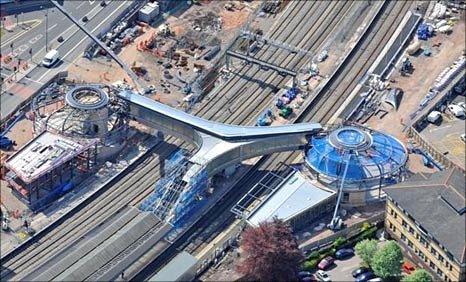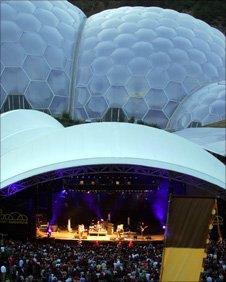Newport's 'bubble wrap' railway station roof laid
- Published

An aerial shot of the revamped Newport railway station, which should be completed by September
It is a futuristic look made famous by the Eden Project in Cornwall and the Water Cube at the Beijing Olympics.
Now Newport railway station is following their lead by installing a "bubble wrap" roof.
The 31 futuristic air-filled plastic cushions are being used in the concourse of the redeveloped station.
Network Rail says the material, which is eco-friendly, will create a "distinctive look" for the station.
Work on the new roof, created using two layers of film measuring around two to three strands of hair in thickness, marks the last phase of work at the station, which is due to open to passengers in September.
The cushions, which give a "bubble-wrap effect", were originally designed for the space industry.
The material is recyclable, does not degrade under ultra-violet light or atmospheric pollution and its unique non-stick, self-cleaning design means that grime can be easily removed by rain.

The Eden Project has the distinctive 'bubble wrap' roof
It is only 1% of the weight of glass and transmits more light, while Network Rail said it is also cost-effective as it means less steel is needed to support the roof.
The work, which is part of a £22m station revamp, will provide Newport with a "landmark to be proud of", according to Mike Gallop, principal programme sponsor at Network Rail.
"Our innovative approach will produce a distinctive station that is cost-effective to build and maintain, eco-friendly and fit for the 21st Century and beyond," he said.
Ian Bullock, customer services director at Arriva Trains Wales, said: "Newport station is now leading the way in terms of its green credentials and we hope that it will become a flagship of how to construct in an environmentally friendly way."